| Ambassador of the United States to the Holy See | |
|---|---|
| Apostolicae Sedis Legatus Civitatum Foederatarum | |
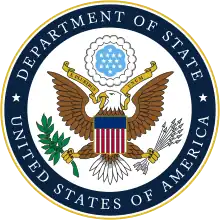 Seal of the United States Department of State | |
| Nominator | The President of the United States |
| Appointer | The President with Senate advice and consent |
| Inaugural holder | William A. Wilson as Ambassador Extraordinary and Plenipotentiary |
| Formation | April 9, 1984 |
| Deputy | Theodore Diehl |
| Website | va |
The ambassador of the United States to the Holy See is the official representative of the United States of America to the Holy See, the leadership of the Catholic Church. The official representation began with the formal opening of diplomatic relations with the Holy See by President Ronald Reagan and Pope John Paul II in 1984.[1]
Before the establishment of formal diplomatic relations, President Franklin D. Roosevelt's Postmaster General James Farley was the first high-ranking government official to normalize relations with the Holy See in 1933.[2] In addition, Myron Taylor would serve during World War II as an emissary for President Franklin D. Roosevelt. In 1951, President Harry S. Truman's pick of World War II hero Mark W. Clark was defeated.
Between 1951 and 1968, the United States had no official representative accredited to the Holy See. President Richard Nixon changed this when he appointed Henry Cabot Lodge Jr. as his personal representative. President Jimmy Carter followed with the appointment of former New York City mayor Robert F. Wagner Jr. Every ambassador to date has been a member of the Roman Catholic Church. The current ambassador is Joe Donnelly, who presented his credentials to Pope Francis on April 11, 2022.[3]
History before formal diplomatic relations established
The United States had diplomatic relations with the Papal States from 1797 to 1867. The Papal States ceased to exist in 1870, when its last territory (the city of Rome) was lost to the Kingdom of Italy. After that, the international status of the Papacy was controversial until 1929, when the Italian government agreed to the establishment of Vatican City as a sovereign city-state.
The United States was slow to establish full diplomatic relations with the re-established Holy See, partly due to the prevalence of anti-Catholicism in the United States. President Franklin D. Roosevelt's Postmaster General James Farley was the first high-ranking government official to normalize relations with the Holy See in 1933 when the Postmaster General set sail for Europe, along with Soviet Commissar of Foreign Affairs Maxim Litvinoff on the Italian Liner SS Conte di Savoia. In Italy Farley had an audience with Pope Pius XI, and dinner with Cardinal Pacelli, who was to accede to the papacy in 1939.[2] Myron Charles Taylor, an industrialist, philanthropist and diplomat (starting with World War II), served from December 1939 until 1950 as an emissary to Pope Pius XII for Presidents Franklin D. Roosevelt and Harry S. Truman.
On October 20, 1951, Truman nominated Mark W. Clark, a U.S. Army general and World War II hero, to be emissary to the Holy See. Clark later withdrew his nomination on January 13, 1952, following protests from U.S. Senator Tom Connally from Texas and Protestant groups.
Between 1951 and 1968, the United States had no official representative accredited to the Holy See.
In 1969, President Richard Nixon changed this when he appointed—as his personal representative—Henry Cabot Lodge Jr., a former U.S. Senator from Massachusetts, Nixon's 1960 Republican vice presidential running mate and a former U.S. ambassador (to the United Nations, South Vietnam, and West Germany).
In 1978, President Jimmy Carter followed with the appointment of Robert F. Wagner Jr., a former mayor of New York City and U.S. Ambassador to Spain.
| Image | Name and title | Presentation of credentials |
Termination of mission |
|---|---|---|---|
| Jacob L. Martin, Chargé d'Affaires | August 19, 1848 | August 26, 1848 | |
| Lewis Cass Jr., Minister Resident | November 19, 1849 | November 27, 1858 | |
.jpg.webp) |
John P. Stockton, Minister Resident | November 27, 1858 | May 23, 1861 |
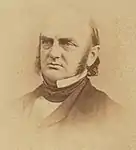 |
Alexander Randall, Minister Resident | June 6, 1862 | August 4, 1862 |
%252C_US_Minister_to_the_Vatican.jpg.webp) |
Richard Milford Blatchford, Minister Resident | November 26, 1862 | May 20, 1863 |
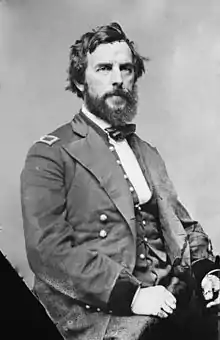 |
Rufus King, Minister Resident | January 8, 1864 | August 17, 1867 |
List of ambassadors
The following is a list of U.S. ambassadors to the Holy See:
| Image | Name | Years served | Pope | U.S. President |
|---|---|---|---|---|
.jpg.webp) |
William Wilson[lower-alpha 1] | 1984–1986 | John Paul II | Ronald Reagan |
.jpg.webp) |
Frank Shakespeare | 1986–1989 | ||
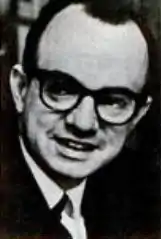 |
Thomas Patrick Melady | 1989–1993 | George H. W. Bush | |
_(2).jpg.webp) |
Raymond Flynn | 1993–1997 | Bill Clinton | |
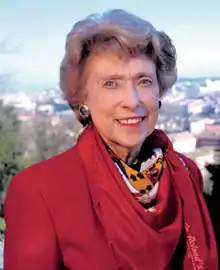 |
Lindy Boggs | 1997–2001 | ||
.jpg.webp) |
James Nicholson | 2001–2005 | George W. Bush | |
 |
Francis Rooney | 2005–2008 | Benedict XVI | |
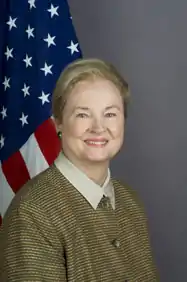 |
Mary Ann Glendon | 2008–2009 | ||
 |
Miguel H. Díaz | 2009–2012 | Barack Obama | |
| Mario Mesquita (Chargé d'Affaires)[4][5] | 2012–2013 | |||
 |
Ken Hackett | 2013–2017 | Francis | |
.jpg.webp) |
Callista Gingrich | 2017–2021 | Donald Trump | |
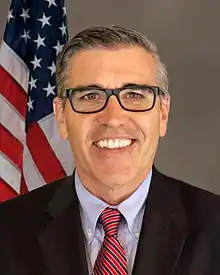 |
Patrick Connell (Chargé d'Affaires) | 2021–2022 | Joe Biden | |
 |
Joe Donnelly | 2022–present |
Vacancy controversies
In 2009, the post of ambassador remained vacant for several months because of tensions between the Vatican and the Obama Administration over the issues of abortion and same-sex marriage.[6] Three candidates were mentioned, including Caroline Kennedy and Douglas Kmiec.[6][7][8]
From November 2012 through mid-2013, the seat was also vacant, after Miguel H. Díaz left the office to teach at the University of Dayton. President Barack Obama nominated Ken Hackett, a longtime president of Catholic Relief Services, for the position in June 2013.[9] Ken Hackett was confirmed by the U.S. Senate as U.S. Ambassador to the Holy See on August 1, 2013.[10][11]
See also
Notes
- ↑ From 1981 to 1984, Wilson was Reagan's personal representative to the Holy See.
References
- ↑ Mission Statement Archived April 23, 2016, at the Wayback Machine from the website of the U.S. Embassy to the Holy See
- 1 2 "Jim Farley S Story". Whittlesey House. February 17, 1948 – via Internet Archive.
- ↑ "Le Lettere Credenziali dell'Ambasciatore degli Stati Uniti d'America presso la Santa Sede". press.vatican.va. Retrieved April 11, 2022.
- ↑ "U.S. ambassador to the Vatican resigns to take teaching position in Ohio". November 5, 2012. Retrieved June 29, 2022.
- ↑ "Deputy Chief of Mission Mario Mesquita". March 31, 2022. Retrieved June 29, 2022.
- 1 2 "Obama's candidates for Vatican ambassador failing 'simple standard'". Catholic News Agency. April 9, 2009. Retrieved May 17, 2009.
- ↑ "The Vatican versus the White House". Irish Independent. April 18, 2009.
- ↑ "Pope 'rejects Caroline Kennedy for being too liberal'". The Times. April 15, 2009.
- ↑ Jaweed, Kaleem (June 14, 2013). "Ken Hackett To Be Nominated As Ambassador To Vatican". Huffington Post. Retrieved June 18, 2013.
- ↑ Rivera. "CRS Congratulates Ken Hackett on his Confirmation as US Ambassador to the Holy See". Catholic Relief Services. Retrieved August 2, 2013.
- ↑ Gibson. "Former charity head confirmed as US ambassador to Vatican". Washington Post. Retrieved August 2, 2013.
 This article incorporates public domain material from U.S. Bilateral Relations Fact Sheets. United States Department of State.
This article incorporates public domain material from U.S. Bilateral Relations Fact Sheets. United States Department of State.